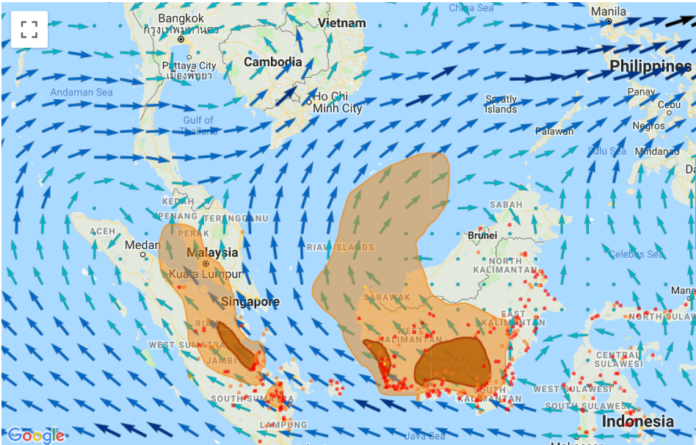
PETALING JAYA, 20 SEPTEMBER 2019: Malaysia’s skies have been severely impacted by transboundary smoke haze since September 8, 2019, no thanks to large-scale peatland burning incidents in Southern Sumatra and Borneo Islands. The Air Pollution Index (API) in the country has increased to Hazardous levels of up to 414 in parts of Malaysia on 19 September 2019. The haze is being carried to Malaysia by the prevailing wind blowing from Indonesia to Malaysia (see image below), but in certain locations is exacerbated by local air pollution and fires.

“The root cause of the fires and haze is the severe drought occurring in southern Borneo and Sumatra since July 2019. According to the latest medium-term weather predictions, the drought in southern Sumatra and Kalimantan will likely continue till December 2019” said Faizal Parish, Director of Global Environment Centre (GEC), a leading adviser to the ASEAN Member States on peatland management and haze issues.
“These dry conditions are increasing the vulnerability of peatlands to fire. Although the Indonesian government has been trying prevent fires and rewet drained peatlands, the severe drought – combined with ongoing land clearing mainly by local and migrant communities’ has led to extensive fires.” He added.

The drought is being driven by the Indian Ocean Dipole (IOD) Weather Phenomenon. IOD Phenomenon is an irregular oscillation of sea surface temperature. The Western part of the Indian Ocean becomes warmer while the eastern part becomes cooler, reducing rainfall in Indonesia. The IOD happens on average once in 6 years and 2019 is expected to have one of the strongest IODs on record. As a result of the IOD, rainfall in Indonesia for the next five months is expected to be significantly less than normal.
GEC predicts the extensive fires in southern Borneo and Sumatra will be hard to prevent and control and may potentially burn till November or December 2019. Transboundary Haze is driven by prevailing winds. Normally the wind will blow from Indonesia to Malaysia between July to October and from Malaysia to Indonesia between November to March. Therefore, transboundary haze will likely continue till October and maybe till November 2019.
Efforts need to be redoubled in Indonesia to control existing and prevent new fires. Malaysian and Indonesian Plantation companies operating in Indonesia together with the government and other stakeholders must enhance fire prevention measures and improve response capacity.

Since the fires are being driven by Global climate factors – we should not just blame Indonesia for the haze – but instead support measures to control and prevent more fires from occurring in the ongoing drought. GEC is working with private companies, local communities and local government in SW Borneo and Riau Province as well as in Selangor and Pahang States in Malaysia to help control peatland fires and prevent the haze. We invite all Malaysian public and companies to support these measures.